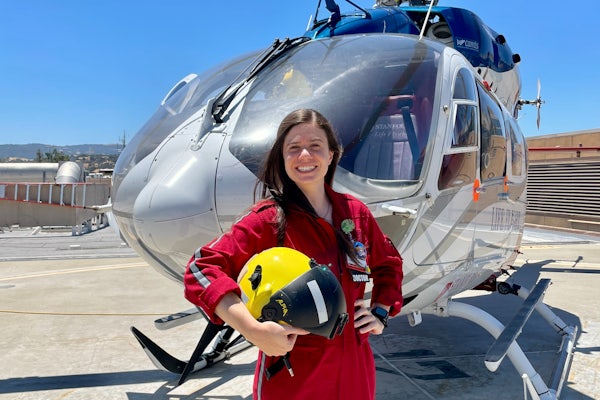Alumna honored for efforts to improve medical care for human trafficking victims
Nicole E. McAmis was recognized for her work developing an app that would help providers identify and support those in need

Emergency medicine requires quick-thinking and excellent problem-solving skills. Is that patient who’s complaining of abdominal pain experiencing bowel necrosis or just indigestion?
Scenarios such as that are what drew Nicole E. McAmis, who graduated from Washington University in St. Louis in 2016, to the field.
"I knew I would always be learning because you never know what will walk in the door,” she said. “There are always traumas, but sometimes you are also functioning as an internal medicine or a primary care physician because patients come in for simple complaints like a sore throat or a cough.”
She credits her engineering degree with giving her the skills to manage the unpredictability.
"Engineering is based on problem solving," she said. “A lot of the classes we take show you a problem and present you with the tools to learn how to solve them. It taught me to approach them from multiple different angles.”
A first-generation college student, McAmis graduated from the School of Engineering in 2016 with a bachelor’s degree in chemical engineering and a minor in music. She went on to graduate with her medical degree from the Frank H. Netter, MD, School of Medicine at Quinnipiac University and is now a second-year resident in emergency medicine at Stanford Medical Center.
“Chemical engineering is one of the most challenging majors and it helped me immensely when it came to studying for medical school and board exams,” she said. “Earning my engineering degree was a great accomplishment and something that I am still proud of.”
And McAmis has accomplished a lot. Recently, she received the Outstanding Contributions to Emergency Medicine Education award from the American College of Emergency Physicians and Emergency Medicine Residents’ Association during their annual conference. She was lauded for her work developing an app and conversation toolkit that helps health care providers identify and support patients who may need additional interventions, such as victims of human trafficking or gun violence.
“The toolkit offers red flags, simple questions and approaches to difficult conversations,” McAmis said. “It is a way to build trust and rapport with patients because if you lack that aspect, then you are not able to provide the best comprehensive care.”
There’s a clear need for this tool as well. A paper co-authored by McAmis found that less than half of surveyed health care providers received formal training on recognizing and helping victims of human trafficking.
“I recently developed a human trafficking training program that I am currently implementing at Stanford to help health care providers at our institution understand how to identify potential victims,” she said. “I would like to create an online course for other providers across the country since it is one of those topics that is not discussed enough."
McAmis said she’s invested in helping others and hopes to return to Southern California, where she grew up, and improve emergency medical services in the area. Since the emergency department is accessible to anyone, she said it’s important that providers are aware of and trained to handle the variety of situations they may face.
“We see people from affluent backgrounds, people who are homeless, and people who are immigrants and do not have medical insurance,” she said. “You have to consider the different public health situations because they are all exposed to different situations and will present with different problems and chief complaints.”



